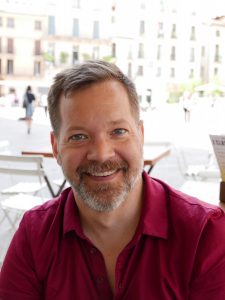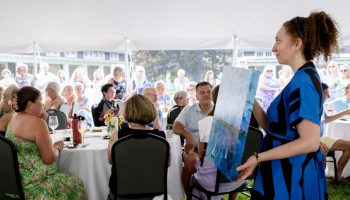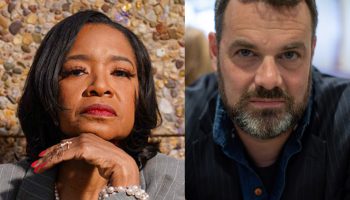
For tenure-track faculty at most American colleges and universities, “publish or perish” is a mantra, and vacations are few and far between. Given the exceedingly high cost of higher education and increasing preference for STEM courses and labs, the humanities are being downsized where budgets are tight.
Fortunately, the decade-old Carolina-Duke Graduate Program in German Studies is bucking this trend and demonstrating that the academic disciplines that study aspects of human culture and society — the liberal arts — are invaluable for assessing complex contemporary issues and problems.
At 9:15 a.m. Thursday, July 25 at the Chautauqua Women’s Club, Richard Langston, professor of German literature at the University of North Carolina at Chapel Hill, will give a presentation titled, “How Art and Literature Shaped the Idea of War.”
Langston has been a member of UNC’s Department of Germanic and Slavic Languages and Literatures since 2002, when he earned his doctorate at Washington University in St. Louis.
He said majoring in German literature “felt right” when the Berlin Wall fell in 1989, while he was a sophomore at the University of Vermont.
From 2014 to 2018, Langston served as the Zachary Smith Distinguished Term Associate Professor and Chair in Teaching and Research at UNC. In 2016, he was also a Distinguished Visiting Professor at UNC’s closest partner in Germany, Eberhard Karls University of Tübingen. And from 2011 to 2012, he was honored as an Alexander von Humboldt Foundation fellow.
“What people don’t know of, is the slow death of the humanities,” Langston said. “It’s happening in real time. … Institutions have become ever-indifferent to the importance of the humanities. Parents, too — it’s been supply-and-demand logic in the last decade and a half.”
According to Langston, administrators of many publicly-funded universities have been deciding that they’ll leave the teaching of the humanities — which include the fields of anthropology, archaeology, arts (performing and visual), classics, history, linguistics and languages, literature, philosophy and religion — to private institutions.
“What happens if only Yale, Harvard and Princeton teach arcane things?” Langston said. “We’re left with a small bank of knowledge.”
The lecture courses and seminars that Langston teaches most frequently are anything but esoteric.
They include: “The German Idea of War,” “Gangsters, Freedom Fighters, and Cold-Blooded Killers: Representations of Violence and Terrorism in Contemporary German Literature and Film,” “Sex, Drugs, and Rock ’n’ Roll: The 20th Century German Philosophers and Modern Youth Cultures,” and “Avant-Garde Cinema: History, Themes, Textures.”
“I’ve put lots of effort into classes that students would want to take,” Langston said. “My students are deeply afraid of philosophy. I want to make it clear to them that it’s accessible and fun.”
In focusing on the 20th and 21st centuries — crisscrossing the media divides between German literature, film, television and art — and grounding his teaching and scholarship in philosophy, he has succeeded.
For instance, Langston said he’s had 180 undergraduates enroll at one time in his “Sex, Drugs, and Rock ’n’ Roll” course — the title of which is his “sales pitch.” Once they start the course, “they realize they’re in for a roller coaster ride.”
Through the lens of German philosophy, they learn about the body, music, art, “the beautiful,” consciousness, reality and altered perception.
“At the Women’s Club, I’ll be giving a lesson from a lecture at UNC,” Langston said. “I’m going to have a class. (It’s) about World War I, philosophy and art in the widest sense.”
He said he developed the idea for his semester-long course in conjunction with the 100th anniversary of the “Great War” — World War I.
“There was a call for papers or new courses at my university,” Langston said. “Everyone else offered the British or American perspective. No one stepped up to the German side. … Why would a whole generation of men march into war? Why would they think it is other than a death sentence? To my students, the war seems so far away.”
His course — “The German Idea of War” — attracts as many as 120 students at a time. It considers how seminal philosophers, painters, filmmakers, poets and writers who anticipated, experienced or survived World War I, shaped and told its story.
“How did young, militaristic people think?” Langston said. “Literature gives … an incredibly precise answer. … What was this belief in the hero, the war hero? Why was everyone a hero who marched into war? Everyone here in the U.S. is a hero if they do something. … But then and there — in Germany before and during World War I — there was a particular concept.”
Langston said his course looks to literature to “understand how young German soldiers sought and defined war.” His students also view early films, listen to music and look at art.
He said he’s particularly interested in what the war did to the art called “German Expressionism.” The poems that Germans wrote in the trenches were closely aligned to it.
At the CWC, Langston will focus on the visual arts, especially the Russian painter and art theorist Wassily Kandinsky, who — with the German painter and printmaker Franz Marc and three other male artists — formed the Blue Rider group (Der Blaue Reiter). Marc was one of the key figures in German Expressionism.
“Blue Rider is one of the most important, renowned, avant-garde artistic groups that are, to this day, romanticized as some of the greatest contributors to art in the early 20th century,” Langston said. “The Germans weren’t the most avant-garde in late 19th-century art; the French were. Paris is where many Germans took their lessons.”
In the early 20th century, however, Munich became a competitor. Langston said the Blue Rider artists “were diagnosing the world’s ills and sought to solve them with painting. … Painting became implicated in a way of waging war.”
According to Langston, Kandinsky and Marc confronted the problems of lack of spirituality (geist), modernization (including noise, traffic and crowds), and the modern world of technology. He will show examples of their paintings.
At UNC, Langston’s students also explore “the way in which technology was implicated, used and employed (as) a religion to bring victory … (and) seen as a panacea for problems of war.”
For instance, he said they study the “Red Baron” — Manfred von Richthofen. Despite being shot down and killed in April 1918, when he was only 25 years old, he remains one of the world’s best-known fighter pilots. Langston’s students read von Richthofen’s diaries and are exposed to other “stories that historians don’t really tell.”
Not only do they become attuned to the intricacies and importance of reading and seeing, but also the art of discussion.
Langston’s academic research, which focuses on the 1960s to the present, is international in scope. He said that his many publications on the relationship between literature, film, art and philosophy — including edited and co-edited volumes, book chapters, journal articles, exhibition catalogues, translations, book reviews and conference papers — have brought new attention to UNC.
Visions of Violence: German Avant-Gardes After Fascism was Langston’s first book, published in 2008. He is the editor of the forthcoming Difference and Orientation: An Alexander Kluge Reader, to be published later this year by Cornell University Press. Currently, he is completing another book, Dark Matter, in Defiance of Catastrophic Modernity.
“One of my greater contributions is helping create a strong program in German in an era where administrations kill programs when they don’t see the numbers (of students),” Langston said. “(We’re seeing) those numbers stay strong.”
To date, he and his colleagues have been creatively staving off what he referred to as “the paradigm shift forced upon” the humanities throughout the United States.




